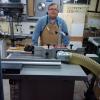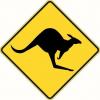
Originally Posted by
Steve Mathews

You stated "machining boards is easier if done in Metric" and others have made similar comments that working in Metric is easier. I'm curious, how so? What makes using this system of measurement easier? I frankly don't see one any easier than the other to use. They're both just arbitrary units of distance, history of origin aside.
In general, any system is as easy as it is for the given worker...and ease of use is certainly subjective. Metric's benefit is no fractions and it's based on the number ten so as has been mentioned the math is a little easier. Converting after a virtual lifetime of working in Imperial isn't hard around the using the system. The difficulty is with visualization. Some of them are easy, such as 2" being ~50mm, etc. It's in the longer dimensions that those of us who have chosen to convert have to do more work to be able to "see" something without doing a conversion from what we know. After two years in with my "mostly metric" decision, I'm a lot farther along in that which is nice. Will I be able to "see" in metric fully? I don't know if or when that will happen or if it really needs to be accomplished. I'm still very happy that I chose to go this route.
--
The most expensive tool is the one you buy "cheaply" and often...






 Reply With Quote
Reply With Quote






